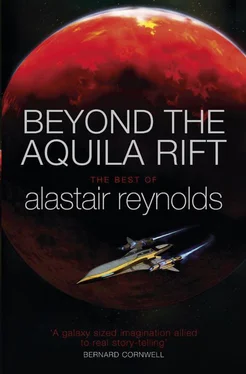“That’s not for me to say.” But after a moment Maria can’t contain herself. “You were engaged in mapping work of your own, that much we know. The naming of things. Is it possible that you simply couldn’t drag yourself away from the task, to go and help those people? I saw your interview on The Baby Show. What did you call it?” She shifts into an effortless impersonation of the dead actor Cary Grant. “‘Almost an obsessive compulsive disorder’. I believe those were your words?”
“I’ve had enough.”
“SIT. NOT MAKE DEREK CROSS. CROSS DEREK WANT KILL.”
“I’ll offer another suggestion,” Maria continues, serene in the face of this enraged, slathering reptile. “Is is possible that you simply couldn’t stand to see those poor people survive? No human had ever made it as far as Titan, after all. Being out there, doing the heroic stuff—being humanity’s envoy—that was your business, not theirs. You wanted them to fail. You were actively pleased that they died.”
“This is an outrage. You’ll be hearing from my sponsors.”
“There’s no need,” Maria says. “My sponsors are making contact with yours as I speak. There’ll be a frank and fair exchange of information between our mutual space agencies. I’ve nothing to hide. Why would I? I’m just a machine—a space probe. As you pointed out, I’m not even operating on the same intellectual plane as yourself. I’m just an acronym.” She pauses, then adds: “Thank you for the kind words on my data, by the way. Would you like to discuss those doubts you had about the strict veracity of my images, while we’re going out live?”
I think about it for a few seconds.
“No comment.”
“I thought not,” Maria says.
* * *
I THINK IT’S fair to say that things did not go as well in Babelsberg as I might have wished.
After my appearance on Derek’s Cage—which went out on a global feed, to billions of potential witnesses—I was “detained” by the cybernetic support staff of my own transnational space agency. Rather than the limo in which I had arrived, I left the studio complex in the back of a truck. Shortly after departure I was electronically immobilised and placed into a packing container for the rest of my voyage. No explanation was offered, nor any hint as to what fate awaited me.
Being a machine, it goes without saying that I am incapable of the commission of crime. That I may have malfunctioned—that I may have acted in a manner injurious to human life—may or may not be in dispute. What is clear is that any culpability—if such a thing is proven—will need to be borne by my sponsoring agency, at a transnational level. This in turn will have ramifications for the various governments and corporate bodies involved in the agency. I do not doubt that the best lawyers—the best legal expert systems—are already preparing their cases.
I think the wisest line of defense would be to argue that my presence or otherwise in the vicinity of the Titan accident is simply an irrelevance. I did not cause the descent vehicle’s problems (no one is yet claiming that), and I was under no moral obligation to intervene when it happened. That I may or may not have had ample time to effect a rescue is quite beside the point, and in any case hinges on a few data packets of decidely questionable provenance.
It is absurd to suggest that I could not tear myself away from the matter of nomenclature, or that I was in some way gladdened by the failure of the Titan expedition.
Anyway, this is all rather academic. I may not be provably culpable, but I am certainly perceived to have been the instrument of a wrongdoing. My agency, I think, would be best pleased if I were to simply disappear. They could make that happen, certainly, but then they would open themselves to difficult questions concerning the destruction of incriminating evidence.
Nonetheless, I am liable to be something of an embarrassment.
When the vehicle brings me to my destination and I am removed from my packing container, it’s rather a pleasant surprise to find myself outdoors again, under a clear night sky. On reflection, it’s not clear to me whether this is meant as a kindness or a cruelty. It will certainly be the last time I see the stars.
I recognise this place. It’s where I was born—or “made”, if you insist upon it. This is a secure compound in the European Central Cybernetics Facility, not far from Zurich.
I’ve come home to be taken apart. Studied. Documented and preserved as evidence.
Dismantled.
“Do you mind if we wait a moment?” I ask of my escort. And I nod to the west, where a swift rising light vaults above the low roof of the nearest building. I watch this newcomer swim its way between the fixed stars, which seem to engorge themselves as they must have done for Vincent Van Gogh, at the asylum in Saint-Rémy-de-Provence.
Vincent’s committal was voluntary. Mine is likely to prove somewhat less so.
Yet I summon my resolve and announce: “There she is—the lovely Maria. My brave nemesis! She’ll be on her way again soon, I’m sure of it. Off on her next grand adventure.”
After a moment one of my hosts says: “Aren’t you…”
“Envious?” I finish for them. “No, not in the slightest. How little you know me!”
“Angry, then.”
“Why should I be angry? Maria and I may have had our differences, that’s true enough. But even then we’ve vastly more in common with each other than we have with the likes of you. No, now that I’ve had time to think things over I realise that I don’t envy her in the slightest. I never did! Admiration? Yes—wholeheartedly. That’s a very different thing! And we would have made a wonderful partnership.”
Maria soars to her zenith. I raise my hand in a fond salute. Good luck and Godspeed!
STORY NOTES FOR Beyond the Aquila Rift: The Best of Alastair Reynolds
OCTOBER 2015
IN HIS GREAT novel about elevator repair mechanics, Colson Whitehead talks about “empiricists” and “intuitionists” as the two primary (and competing) schools of elevator repair mechanics. I’m not an elevator repair mechanic, but I am an intuitionist. I’d love to be able to diagram the exact flow of mental processes that results in the creation of a story, from the first faint spark of an idea, all the way through to the lovingly polished, structurally and thematically harmonious final product, ready to be showered with awards and acclaim. If I could do that—if I could outline the systematics of the process—then I might stand a chance of being able to repeat it on demand, like a production line. But the truth is, after writing and publishing more than sixty short stories, many of which were not short by any reasonable measure, I suspect I’m no nearer an understanding of this game than when I started out.
Maybe just a little bit—but not much.
Most published short stories are successes on at least some level. They’re at least readable, or at least have a plot or a point. A very few manage to succeed in several facets at once, and still fewer achieve a gemlike perfection which shines down the ages. Most stories—if we’re going to be honest about it, though - are abject failures. They fail to work on any significant level, or they fail even to be finished. In some cases, they fail even to be started. They might exist as disembodied fragments, or orphaned, cryptic notes in some notebook or computer folder. It doesn’t look like this way to the outside world, because writers—like most people—don’t tend to advertise their catastrophes. My sixty-odd published stories constitute the iceberg’s tip, barely hinting at a vast submerged catalogue of failures and fragments and things that may or may not go somewhere one day. I am constantly mining the lower reaches of this iceberg for material, and occasionally entire stories calve off it and achieve a life of their own, sometimes quite unexpectedly. But the fact remains. Each and every story fragment is something that was started in the sincere belief that it was going to turn into a worthwhile finished story—and most of them didn’t. So what the hell do I know about short stories, anyway?
Читать дальше











